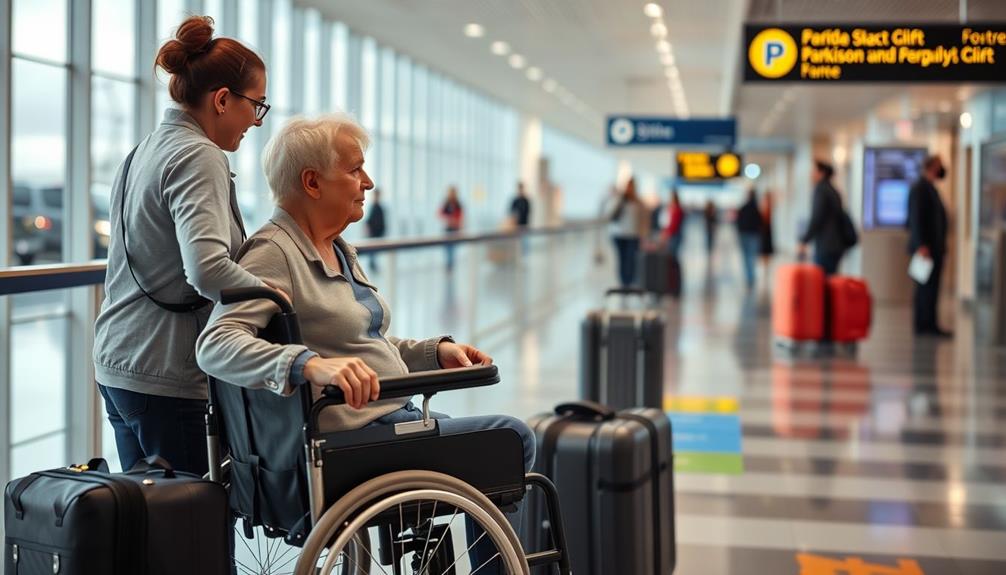Traveling with a Parkinson's patient takes careful planning and attention. Start by consulting with their neurologist 4-6 weeks in advance for advice on medications and local healthcare resources. Create a detailed itinerary that includes nearby medical facilities and set aside time for rest to combat fatigue. Pack all necessary medications and medical supplies, keeping them in original containers for clarity. Choose accessible transportation and accommodations to enhance comfort. Remember to keep hydration a priority and inform travel services of specific needs. There's a lot more you can consider to make the journey smoother and more enjoyable.
Key Takeaways
- Consult a neurologist 4-6 weeks before travel for medical advice and local provider referrals.
- Create a personal budget, including healthcare expenses, to manage costs effectively during the trip.
- Pack essential medications in original containers and maintain a detailed list with dosages and doctor contacts.
- Choose accessible transportation and accommodations, and arrange for assistance at airports or stations.
- Stay hydrated by drinking at least 32 ounces of water daily and inform travel services of the Parkinson's diagnosis for accommodations.
Plan Ahead for Travel

Planning ahead for travel is essential when you're accompanying a Parkinson's patient. Start by consulting with your neurologist 4-6 weeks before your trip. Discuss potential medical scenarios and ask for referrals to local Parkinson's healthcare providers at your destination. This step guarantees you're prepared for any issues that may arise.
Additionally, it's important to track your budget for the trip, as creating a personal budget can help manage any expenses related to travel and healthcare needs.
Next, create a detailed travel itinerary that includes contact information for nearby medical facilities and professionals. This will help you feel secure knowing assistance is just a call away.
Don't forget to plan for travel days; schedule rest days before and after your trip to help manage fatigue effectively.
Make sure you pack all necessary medications and medical supplies, as well as any assistive devices your companion may need. If you're flying, consider early boarding options to avoid rushing and stress.
Medication Management Strategies

When traveling with a Parkinson's patient, effective medication management becomes a top priority. You should always keep medications in their original containers with clear labels to avoid confusion. A thorough list of all medications, including dosages and contact information for prescribing doctors, is essential for quick access in emergencies.
| Medication | Dosage | Notes |
|---|---|---|
| Medication 1 | Dosage 1 | Bring extra doses |
| Medication 2 | Dosage 2 | Include a water bottle |
| Medication 3 | Dosage 3 | Plan for time zone changes |
| Medication 4 | Dosage 4 | Request a wheelchair if needed |
When traveling with someone who has Parkinson's Disease, consider scheduling doses around time zone changes. Use alarms or reminders to maintain a consistent schedule. Always carry extra doses along with snacks and a water bottle to manage potential delays. If applicable, bring a certificate for any implanted medical devices to ease security checks. By planning ahead with these medication management strategies, you can guarantee a smoother travel experience for both you and the Parkinson's patient.
Packing Essentials for Comfort

To guarantee a comfortable journey for a Parkinson's patient, packing the right essentials is essential. Start by organizing vital items like medications, identification for Parkinson's, travel tickets, and medical insurance cards. Keeping these easily accessible will minimize stress during your trip.
Additionally, consider the potential need for financial considerations for elderly care when planning your travel budget, as this can alleviate some logistical concerns.
Next, don't forget to include comfort items that can enhance relaxation, such as favorite blankets, neck pillows, and noise-canceling headphones. These little touches can make a big difference in how comfortable your travel companion feels.
For toiletries, use a hanging toiletry bag. This saves space and provides quick access to personal care items.
Additionally, prepare a travel kit that includes snacks, water, and other necessary medical supplies for effective symptom management.
If your travel partner requires mobility aids like canes or walkers, label them with your contact information. This helps prevent loss or confusion while traveling.
Transportation Options and Considerations

Selecting the right transportation can greatly impact the overall experience for a Parkinson's patient. When planning your trip, assess the accessibility of different transportation modes, such as air travel, trains, and buses. Don't hesitate to request assistance to guarantee a comfortable journey.
Additionally, consider choosing accommodations that offer convenient amenities, such as family-friendly water parks, which can provide enjoyable activities during your stay.
At airports and train stations, arrange for wheelchair or electric cart services to facilitate easier navigation and promote energy conservation. Utilize early boarding privileges when flying, as this reduces stress and gives ample time to settle in before departure.
Flexibility is key in your travel plans. Choosing transportation options like trains or cars allows you to control the pace of the journey, making it easier to incorporate necessary rest breaks.
Always check for handicap-accessible restrooms and seating options to accommodate mobility needs during your travels.
Health and Safety Precautions

Health and safety precautions are essential for ensuring a smooth travel experience for a Parkinson's patient. As a care partner, you must prioritize these measures to make traveling enjoyable and stress-free.
It's also advisable to be aware of cold medications overview that might be helpful in managing symptoms during travel. Always carry a detailed list of medications, including dosages and your doctor's contact information.
Set reminders to drink at least 32 ounces of water daily to maintain hydration, as dehydration can worsen symptoms. Inform travel services of the Parkinson's diagnosis beforehand to secure necessary accommodations, such as accessible or modified services like early boarding and wheelchair assistance.
Review local health guidelines and COVID-19 precautions at your travel destination, as these may impact safety and accessibility.
Frequently Asked Questions
What Should You Not Say to Someone With Parkinson's Disease?
When talking to someone with Parkinson's, avoid phrases like "You don't look sick," "Just try harder," or "What's wrong with you?" Instead, acknowledge their experience and show empathy without making assumptions about their condition.
Should People With Parkinson's Travel?
Absolutely, you should travel! It can enrich your life, boost your well-being, and connect you with new experiences. Just plan ahead for your needs, and you'll create wonderful memories while exploring new places.
What Is the Best Vacation for Parkinson's Patients?
The best vacation for you includes accessible beach resorts or wellness retreats. Consider cruises for medical support and organized activities, or guided tours that accommodate mobility needs, ensuring a stress-free and enjoyable experience.
What Is the Most Common Cause of Death in Parkinson's Patients?
Like a shadow creeping in, pneumonia often claims the lives of Parkinson's patients. Swallowing difficulties lead to aspiration, making it the most common cause of death. You should be aware of these risks.
Conclusion
Traveling with a loved one who has Parkinson's can feel like steering through a winding road, but with careful planning, you can turn potential bumps into smooth pathways. By prioritizing their comfort and safety, you create a journey filled with cherished memories rather than worries. Embrace the adventure, stay flexible, and remember: every step you take together is a victory. With the right mindset and preparation, you'll both discover the beauty that lies beyond the horizon. Advocating for loved ones with Parkinson’s means being their voice when needed, ensuring their needs are met, and anticipating moments where extra support might be necessary. Whether it’s requesting accommodations or simply checking in on how they feel during the trip, your role is crucial in creating a positive experience. By staying attuned to their well-being, you not only safeguard their health but also strengthen the bond you share.









